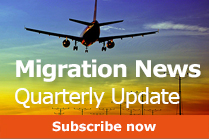In order to achieve the above-mentioned objectives a targeted research programme is proposed. The common inspiration for the five different research themes is the policy question that has already been posed in the introduction: how to optimize the developmental impact of migration by stimulating the positive effect of migration, while mitigating the negative ones. The proposed research projects intend to yield insights into the mechanisms that are responsible for the intended and unintended consequences of migration and M&D policy measures.
The research conducted within the context of the IS-Academie, will on the one hand result in various outputs, such as 5 PhD dissertations, academic articles, and numerous policy briefs and policy papers. These policy briefs and reports will be made available for a larger audience, through publication on the website of the IS Academy (www.is-academie.nl) and the Maastricht Graduate School of Governance (MGSoG) (www.governance.unimaas.nl). Furthermore, printed versions will be distributed through the dissemination channels of the MFA, the MGSoG and other consortium partners. Each of the consortium partners is linked to a specific network. The Maastricht University and ICMPD are strongly linked to the academic communities in developed and developing countries. ECDPM has a strong network among policy makers in ACP countries and with policy designers in developed countries. EIPA and ICMPD have excellent contacts among the European Countries and the (administration of the) European Commission. These links and networks will be used to disseminate the results and output of the research projects, but also to attract both speakers and audiences for the other activities (see below).
On the other hand the results will also serve as input for various other activities that are proposed for the partnership such as conferences, workshops, debates and discussions (e.g. Advanced Academic Updates and the M&D policy debates with European and international policy-makers in Brussels and Geneva.). Furthermore, the policy relevance of the findings can be discussed at these events.
For each research theme an advisory team (twinning) will be set up. These twinning teams will comprise of one or several researchers from the Consortium and one or several MFA policy makers, from the Cluster International Migration as well as from other departments within the ministry or if relevant from other ministries, such as the ministry of Justice and the ministry for Social Affairs and Employment. The role of the team is to discuss the direction of the research, to guide the research, to provide information and input into the research and to pose questions towards the researcher(s).
Research themes
The research programme comprises 5 themes:
- Remittances, development (local economic growth) and poverty alleviation;
- Brain drain and development policy;
- Return migration in the life cycle of migrants;
- The Migration – Development Nexus in EU External Relations
- EU Mobility partnerships: a comparative policy evaluation
These research themes will be elaborated upon in the next paragraphs. One important tool that will be used for several of the researches will be a new-to-be-created database, which will be discussed first.
Database
The construction of the database is an important tool in the proposed research programme. The basic data allow relating migration behaviour of members of families to their economic and social embeddedness in the societies in both the country of origin, as well as the country of destination and to the economic, social and legal conditions under which they live and lived at both sides of the migration flow. This database will provide part of the empirical data for the themes A, B and C
In the field of migration and development, quite some quantitative data is already being collected. Often these data sets lack the linkage between migrants and their families and communities in their countries of origin . The database to be set up for this program will fill this gap.
Given the time and budget constraints, it has been decided that data will be collected among migrants in the Netherlands stemming from 4 countries: Afghanistan, Burundi, Morocco and Ethiopia and their families and networks in the country of origin. Data collection in all the countries will be organized in collaboration with local research partners. Data will be collected both by quantitative surveys and by qualitative data gathering methods. The precise mixture will be decided after a pilot phase. These four countries have been chosen for various reasons. First of all, all 4 countries figure on the list of partner countries for M&D policy. Secondly in terms of numbers migrants from this origin form a fairly large group in the Netherlands. In addition these groups of migrant all have quite a different background and came to the Netherlands in different periods and for different reasons. Lastly also a geographical distribution has been taken into account.
The data base will consist of the following main parts: data on the migration history of the migrant families; data on the social and economic conditions under which the families lived prior to migration and in the receiving country; data on the future migration intentions of migrant families; data on the social and economic networks of migrant families in the country of origin prior to migration and currently, and in the country of destination; data on the social and economic relations between migrant families and their networks in both the countries of origin and countries of destination; data on the policy parameters that affect migrant families in the receiving and the sending country.




